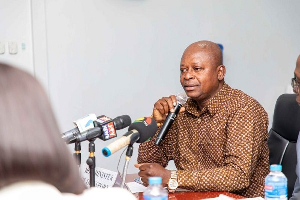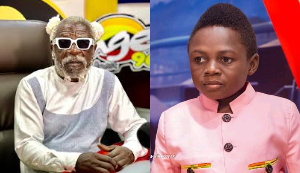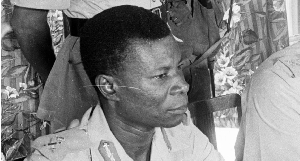Mfantsipim School, Wesley College of Education and Prempeh College all have students’ residential facilities named after Rev T.B. Freeman. Moreover, a centre in Kumasi has been named after him and this is a place where local preachers, evangelists and others in the Methodist Church are groomed for the propagation of the gospel of Jesus Christ.
Reverend Thomas Birch Freeman played at least two important roles in the development of Christianity in the Gold Coast. The Caucasian missionaries who first came to the Gold Coast found it very difficult to adapt to the weather and diseases (orthodox antidote to tropical diseases was virtually non- existent at the time). No sooner did the Caucasian missionaries arrive in the Gold Coast than they passed on to eternity. As a part Caucasian and a part African, Rev. Freeman was endowed with the physiological make-up to contain the vagaries of the weather and diseases. He was thus an important person whose endeavours ensured the continuation of the Methodist Church in the Gold Coast. Through persons like Rev. Freeman, the Methodist Church was stabilised and became an important agent for spiritual and social change.
Service to people
To many people around the world, service to humanity is service to God. In the 180-year period (1835-2015) the Methodist Church has operated in Ghana, the church has offered tremendous contribution to the growth of the society. Professor Kofi Abrefa Busia (Prime Minister of the Second Republic), Dr J.W.S. de Graft-Johnson (Vice-President of the Third Republic) Mr Kofi Atta Annan (Former UN Secretary General), Dr Mohammed Ibn Chambas (Head of the UN office for West Africa - UNOWA) and Mr Kwesi Bekoe Amissah-Arthur (Vice-President of the Republic of Ghana) went to Mfantsipim School, which was established by the Methodist Church Ghana.
Former President J.A. Kufuor attended Prempeh College, which was co-founded by the Methodist Church Ghana. Mrs Justice Georgina Theodora Wood, first female and current Chief Justice of the Republic of Ghana; Professor Naana Jane Opoku Agyeman, first female Vice-Chancellor of the University of Cape Coast and Minister of Education; and Professor Elizabeth Ardayfio-Schandorf, first Emerita Professor of Geography in Ghana attended Wesley Girls High School. Many brilliant girls in Ghana exhibit a burning desire to enrol at the prestigious Wesley Girls High School, an important creation of the Methodist Church Ghana.
A journey to the interior
Hitherto, the Methodist Church operated on the coastal parts of the Gold Coast, particularly Cape Coast and Accra. It was felt by the leadership of the Methodist Church in the Gold Coast to extend its operations to the interior parts of the colony. Rev. Freeman decided to be the vehicle through whom the church would get to the people in the interior parts of the land.
The Asantes were a fearsome group of people. It was, therefore, not a child’s play to decide to travel to Kumasi with the mission of propagating the gospel of Jesus Christ. Rev. Freeman knew the odds and implications of his intended expedition. However, his faith in the resurrection power of Jesus Christ offered him the ardent impetus to make the trip.
From Cape Coast, Rev. Freeman and his team arrived at Fomena (roughly between the current Central Region and Ashanti Region). Part of his team was dispatched to Kumasi to enquire from the Asantehene at the time (Nana Kwaku Dua I) if the Asante Kingdom was going to accept the Methodist Church in Kumasi. Nana Kwaku Dua gave the green light to the mission. Rev. Freeman and his team thus arrived in Kumasi on April 1, 1839 (The Roots of Ghana Methodism by Dr F.L. Bartels – page 38).
Efforts of Rev. Freeman
The arduous journey made by Rev. Freeman to Kumasi yielded immense benefits. The Methodist Church proved to be an able ally of a fervent disciple, who was on fire for the Lord. Evangelist Sampson Oppong played a pioneering role in the development of what came to be known as the independent churches in Ghana.
Evangelist Oppong collaborated with the Methodist Church in Kumasi to expand the frontiers of Christianity in the Ashanti and Brong Ahafo regions. The Methodist Church adopted the episcopal system in the twilight of the 20th Century. Most Rev. Dr Samuel Asante Antwi became the first Presiding Bishop of the Methodist Church Ghana from 1999 to 2003.
Most Rev. Dr Robert Aboagye-Mensah was the second Presiding Bishop of the Methodist Church Ghana from 2003 to 2009. Most Rev. Professor Emmanuel Asante was the third Presiding Bishop from 2009 to 2015. Most Rev. Titus Kofi Awotwi Pratt was sworn in as the fourth Presiding Bishop of the Methodist Church Ghana on October 4, 2015.
Biblical episcopate
The role of Rev. Freeman in sending the Methodist Church to Kumasi yielded much fruit long after his departure. All four presiding bishops of the Methodist Church Ghana were once associated with the Methodist Church in Kumasi.
Most Rev. Dr Samuel Asante Antwi was the General Superintendent and District Chairman of the Methodist Church in Kumasi in 1995. Most Rev. Professor Emmanuel Asante was the Kumasi Diocesan Bishop of the Methodist Church in 2008. In the early 1980s, Most Rev.Titus Kofi Awotwi Pratt was chaplain at Prempeh College and later became headmaster of the then Methodist Day Secondary School (now Kumasi Wesley Girls’ High School).
Though Most Rev. Dr Robert Aboagye-Mensah did not work in the Kumasi Diocese, he practised the Christian (Methodist) faith in Kumasi when he studied at Prempeh College from 1960 to 1967. The role of Kumasi in the growth of the Methodist Church Ghana is remarkable. Mr Kwame Agyapong Boafo, Lay President of the Methodist Church Ghana and the Rt. Rev. Dr Kwaku Asamoah Okyere, Administrative Bishop of the Methodist Church Ghana, were once in the Methodist Church in Kumasi as lay chairman and diocesan bishop respectively. Under the leadership of Rt Rev. Professor Osei Safo Kantanka (immediate past bishop of the Kumasi Diocese), the Methodist Church in Kumasi made extensive use of the media in the propagation of the gospel of Jesus Christ. On TV, on radio, in the print media and in church planting, the great commission has come alive to many people in and outside the Methodist Church Ghana.
The writer is a teacher and a member of the Methodist Church Ghana.
Writer’s email:jkaobimpong@yahoo.co.uk
Opinions of Wednesday, 14 October 2015
Columnist: Joseph K.A. Bimpong















